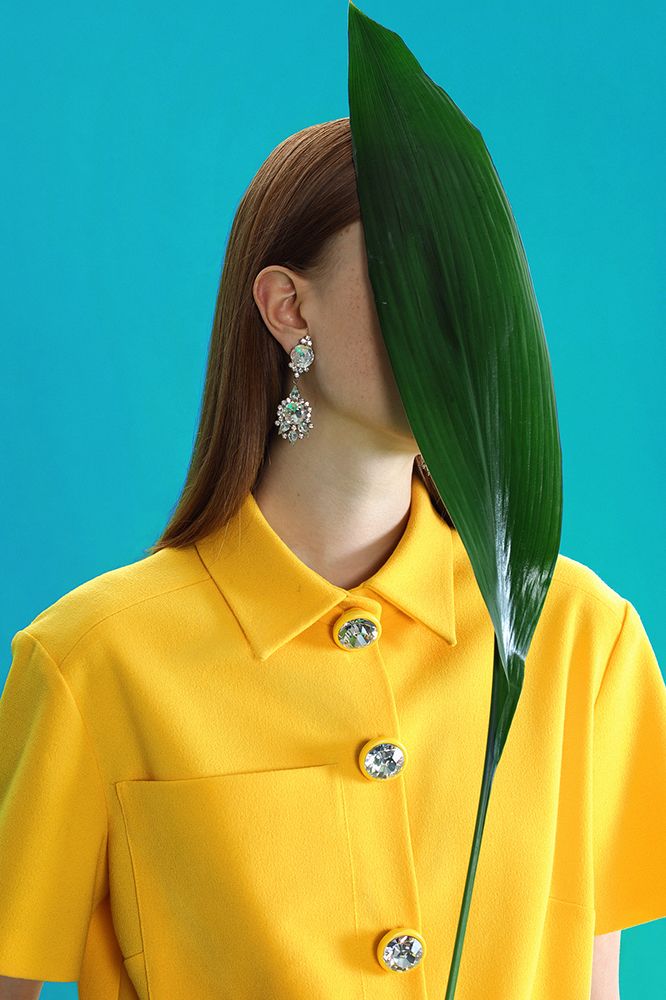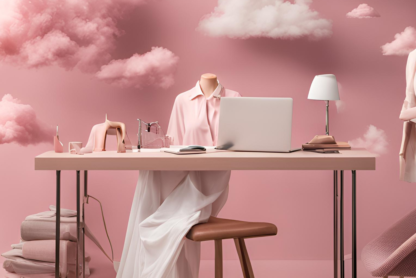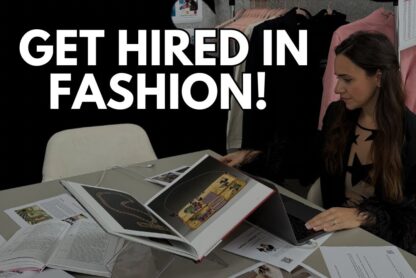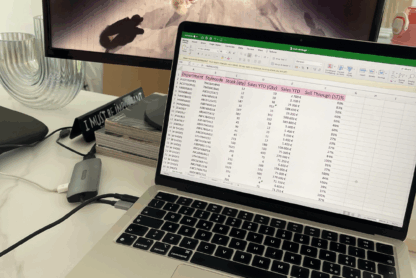Have you ever considered what career path you want to follow in fashion?
Perhaps you are new to the industry, and you are trying to get your foot in the door and figure out which career in fashion is made for you.
Or maybe you are already working in fashion, but you are wondering what the next steps are and how your career can evolve.
I am sure you’ve heard of the expression “climbing the career ladder”. It’s when your title and responsibilities change throughout the years.
And yet, in practice, it’s not always easy to look for the next step in your career and understand what these changes come with.
What does a typical fashion career path look like?
We’ve decided to give you an overview of what a typical career path looks like in the fashion world, with some examples and tips on how to get promoted and move your way up in the company and the industry as a whole.
But first remember that a career in fashion is unique in that it doesn’t follow a rigid, predefined path like becoming a doctor or an engineer, where formal education in medicine or engineering is a non-negotiable requirement.
In fashion, while formal education can be a great starting point, it is not the only path to success. The industry is incredibly versatile, allowing individuals to pivot into different roles based on their interests, strengths, and experiences. Many of the students I’ve mentored, for example, began their journey in fashion design but later discovered their passion for buying or marketing and seamlessly transitioned into those fields. Conversely, those with business or marketing backgrounds often shift into creative roles, such as design or styling, once they’ve developed a deeper understanding of fashion. The ability to change course as your interests evolve makes the fashion industry particularly dynamic. Also, it’s accessible to those with diverse skills and backgrounds.
What should you study to work in fashion?
Formal Education in Fashion
For many aspiring fashion professionals, obtaining a formal education is the first step towards building a career in the industry if they know in advance that this is the career they want to pursue. A degree from a reputable fashion school can provide a strong foundation in the essential skills and knowledge needed to succeed. Programs typically cover areas such as fashion design, textile technology, pattern making, fashion history, and merchandising. Some of the top fashion schools globally, like the Fashion Institute of Technology (FIT) in New York or Central Saint Martins in London, are known for producing industry leaders who go on to work for major fashion houses, or even start their own labels.
Alternative Pathways for Non-Fashion Graduates
While a degree in fashion provides a solid starting point, it is by no means the only pathway into the industry. Many successful fashion professionals have entered the field with degrees in other areas, such as business, marketing, economics, art, or even engineering. The fashion industry is diverse and multifaceted, requiring a wide range of skills that extend beyond design alone. For those looking to transition into fashion without a formal fashion degree remember that online courses can be a great alternative to full-time education. Add to the mix also fashion books and documentaries to nurture your passion and understanding of the industry. All the fashion leaders have one thing in common: their passion and love for fashion. It’s what drives them to do better every day.
Not only does educating yourself give you a step ahead of your competition; but it will also show future employers that you’re very motivated and willing to learn about your future job.
Your first work experience: Fashion internships
After completing your studies, it’s time to get some real experience in the field in which you would like to build a career.
A common mistake many fashion enthusiasts make when they decide to break into the fashion industry is to immediately look for jobs. Job titles like “assistant buyer” or “junior marketing manager” may seem right for you, but these entry-level jobs are not where you want to start your career as they are reserved for people with at least 1 year of experience.
If you have no or little work experience, you need to look for fashion internships.
Interning is the [best] way to get your foot in the door, learn about your dream role, improve your skills, and make your first connections in the industry. Think of internships as your golden ticket to access the fashion world and take your first steps to becoming a valuable professional. Who doesn’t want to be as successful as Anna Wintour, Jacquemus, and Kate Young? Remember this: they all started out at the bottom of the ladder, and worked hard to get to the top, where they are now. Yes, they were interns once.
Some internships can result in a full-time job at the company, which can be really interesting for your career. Always doing your best work and a great attitude are key here (we’ll also talk about how to get promoted at the end of this article). Even if there’s no vacant job at the company where you’re interning, your superior can always recommend and introduce you to a company where there’s a job available.
To find a fashion internship, look for opportunities online or email directly your favorite brands to request an internship in your favorite department, sending your resume, a customized cover letter, and a portfolio.
If you want to learn more about how to approach the fashion internship search, this comprehensive article will guide you through everything related to internships from the types of internships and how to apply for them.
Entry-level jobs in fashion
Your first job, usually right after an internship, is quite an exciting moment in your career. It’s the start of your journey to that dream job as a PR Executive, stylist, merchandiser director, or editor-in-chief.
Your first job is likely to be an assistant’s job or a junior position, depending on which area and company you’re going to work in.
Most of the time it’s your last internship that will turn into a full-time job. Other times you end an internship at a company to start with a full-time job at the next one.
Expectations and responsibilities
Your responsibilities can be similar to those you had in your internship(s) but your title will change from “intern” to “assistant” or “junior pr, buyer, stylist…”. And so will your salary as many internships are unpaid or paid low, whereas in the entry-level job, you will usually start with a base salary depending on the specific company, position, and regulations in your country.
In your entry-level fashion job, you are expected to be fully operational, contrary to internships where you learn and rely more on your boss and colleagues. However, it’s still important to keep learning from colleagues and superiors, as they might teach you a lot.
A lot of motivation, passion, teamwork, and a strong character are just a few of the characteristics you’ll need to demonstrate your professionalism, earn the trust and respect of your superiors, and of course, move your way up.
Getting promoted at a fashion job
After you land a job in fashion, it usually takes at least 1 year to get a promotion. In theory, you’ll start from an entry-level job, as we just saw, then move to a mid-level role, and finally reach a high-level position.
For example, as a designer, your first job will probably be as an assistant designer, then you’ll go into associate designer, followed by designer, senior designer, and eventually creative director.
In public relations, you’ll start out as a PR intern, then PR assistant, Junior PR, PR Manager, PR Director, and finally PR Executive.
In fashion, as in any other industry, a promotion can entail:
- A change of title
- An increase in the salary
- More responsibilities
These usually go hand-in-hand.
The number of years the company has evolved depends on the size of the company and the area of expertise you are in. Note that reaching the senior level at a company can take a long time, especially at large companies. It can take 5, 10, or even 20 years. Passion will get you far, combined with skills and hard work, we’re sure you’ll make it!
How do you get promoted at a fashion job?
Now that we’ve talked about the evolution of the career path in the fashion industry, you are probably wondering HOW exactly you can climb the career ladder and what you need for that.
It’s important to know that a promotion is not something that happens automatically. It is not only determined by years of experience. It usually won’t happen just because you’ve gained 1,3,5 years of experience. Though it’s an important factor (as we saw, no one becomes an editor-in-chief or creative director when they graduate), the real motives to give a promotion to somebody rely on their skills, passion, and goodwill.
There are many things we don’t always take seriously but they are very important and can tell a lot about what kind of professional (or unprofessional) you are. Here are a few tips to secure a promotion at your favorite company and position.
Show responsibility and commitment
“Just do your job” sounds banal. However, think about it: how many times have you felt that you are not getting the best service? We think and complain a lot about it as customers. However, the truth is, everyone makes mistakes when they are on the other side.
While making mistakes is a natural part of the job process, (as long as they are not happening too often) 95% of the time you should be an exceptional employee doing a great job.
What’s a great job?
- You take care of all the tasks that were assigned to you
- You do them fast and bring the desired result
- You keep the work polished and pay attention to details.
These are just a few examples.
Overall try to show how committed you are to this job and the company. Also putting some love into your work – even for the tasks you enjoy doing the least – will get you noticed and appreciated.
Exceed your main responsibilities
A common mistake many professionals make is that they think their responsibilities are only those that are formally outlayed in the contract. When you freshly arrive at your new job or internship, it’s normal to take care only of your primary tasks as you are going through an introductory phase. However, after a couple of months of adaptation, you are expected to do a bit more than you are asked.
Remember: Just doing your job won’t get you fired. But it won’t get you a promotion either.
Demonstrate curiosity
Being curious goes hand-in-hand with exceeding your main responsibilities. On the one hand, it involves growing your expertise by taking additional courses, attending events, reading the news and books, and so on.
On the other hand, being curious means talking to other departments in the fashion company. In most of the jobs, you rarely do everything alone, and you collaborate with other departments. For example, fashion designers don’t develop collections themselves; they rely on buyers and merchandisers to help them with the analysis of past trends and sales to make informed decisions. PR managers are always in touch with event producers. And a marketing specialist will often knock on the communications & graphic design department door to help them create the perfect visuals for a new campaign.
Talking to other departments can also be helpful to:
- Learn about other roles, which can be especially useful at the beginning of your career when you feel undecided between several roles.
- Be aware of what’s happening in the company
- Grow your connections
- And just to be friendly, because the fashion industry is not as big as you may think – let alone one company. Everyone knows everyone. We are one big fashion community.
Be a problem-solver
You’ve probably heard many times that one of the most requested skills is being a problem-solver, but what does it mean?
You can encounter different issues in your day-to-day tasks, such as a missing product sample, a last-minute issue on the day of the event, or a technical bug on the e-commerce platform or WordPress.
When you land a job in fashion, you are not hired only for your time but also for your skills and expertise, and you are encouraged to demonstrate them all along the way.
If there is an issue, as an expert, you cannot say “I don’t know”; you need to come up with a solution or if you cannot solve an issue by yourself, you should at least mobilize the team who could help you.
Be on time
Being on time involves everything from arriving on time (if not earlier) to work and respecting deadlines. Punctuality is one of the best traits every professional should have.
Be positive
Although it sounds cool and funny, we cannot act like Miranda Priestly in The Devil Wears Prada. In the real world, you should always strive to maintain a positive attitude at work.
Don’t criticize your boss and colleagues in a bad way. Note that it’s different from constructive criticism when you discuss the best way to approach a task or negative feedback, for example.
I also don’t recommend getting involved in office gossip & politics.
Finally, try to keep your personal life, issues, and emotions private. It’s okay of course to share some things with your friends at work, and I am also excluding family emergencies, but overall, your private life shouldn’t get into your daily tasks. When you are at your job, you are in the position of a leader – even if you are technically an assistant. By that, I mean that the people you work with and the end consumers impacted by your job count on you to put out your best efforts and bring the desired result.
Last PRO tip: Stay aware of opportunities
Although you can be offered a promotion because of the qualities and skills you demonstrated again and again, it doesn’t mean you should be passively waiting for it.
Once you get your foot in the company, you have a lot of resources to evolve in your career – the Human Resources department and all the staff, even if they are not your direct colleagues. You should use these connections to stay aware of any new opportunities that arise in the company.
In addition, make sure your superiors know about the fact that you’re ready to take on more responsibilities. Many times you just have to ask for things. Prepare a speech or an email that states the results you bring and what other responsibilities you are ready to take on. If what you offer is grounded and interesting for your employer, they may offer you a promotion!
I hope this article gave you more clarity about what to expect from a traditional career path in fashion. I am excited about your journey and believe in you! Let me know here or on my Instagram @glamobserver how you are building your career in fashion, and your struggles and achievements along the way.
Want to know the 5 most effective application tips to break into fashion? Join here my free webinar.







